- Home
- Gareth L. Powell
The Recollection Page 2
The Recollection Read online
Page 2
CHAPTER TWO
THE BUBBLE BELT
Tiers Cross was a small planet orbiting just beyond the outer fringes of the Bubble Belt. It was icy and cold but it had been given an atmosphere, and two artificial orbiting suns that kept the surface from completely freezing up.
Only one city sprawled across its icy plains. Uptown, there were bright lights, crowds and skyscrapers, but down by the spaceport, drifters and tired hustlers worked the narrow streets. They huddled at windy intersections in flapping coats, waiting for the right deal, the big score. Katherine Abdulov moved among them, avoiding the ebb and flow of their skinny bodies. She had an appointment to keep with a potential client. Her insulated boots crunched on the frozen ground, her breath coming in ragged clouds. She wore a long grey coat over a set of stained ship fatigues, and a warm cap with fur earflaps. The glyphs on her shoulder identified her as the master of the Ameline, an old trading vessel currently mothballed in orbit.
She walked through the same old familiar street smells: the greasy stink of the fast food joints, the mingled reek of urine and vomit, the burned plastic tang of fuel drum alley fires. Her ears picked up the electric fizz of the illuminated signs in the windows of the bars she passed; the buzz of a tattooist’s needle from a shop on the corner; raised voices and the crash of shattering glass off somewhere down the block.
Above the street, the Bubble Belt stretched across the night sky like a curtain of beads, filling the heavens. It was a Dyson swarm of bubble habitats, as wide as the orbit of Mars. There were maybe a billion individual habitats in there, each one sporting a different size, shape and internal environment. No-one knew who’d built them. Most were between one and two hundred metres across. Some had working biospheres with animals and insects. Others were tight-packed mazes of empty corridors. Some were filled with water or gas, others with nothing more than soil. But all were as unique as snowflakes, and all perfectly self-contained.
At the Belt’s heart, something like a naked singularity lay wreathed in a fog of incandescent gas. As a fixed point where the rules of space and time broke down, it resisted the mind’s attempts to interpret it. When looking at it, some saw a mirrored sphere, others a greasy, writhing mess of flabby tendrils. Nobody saw it in the same way twice. It had driven good men insane. It was an inexplicable gnarl in the grain of the universe and after a while, in order to preserve your sanity, you learned to stop noticing it.
Although a handful of the Dyson habitats had been settled, the vast majority remained unexplored. The crews scouting them called themselves ‘bubble breakers.’ In all, there were upwards of fifty breaker crews operating in the Belt at any one time. They were salvage teams and they were scavengers. They hit the bubbles, drilled their way in, stripped out anything useful-looking, and auctioned it online, to the highest bidder. It was a dirty and dangerous get-rich-quick kind of a job, and in these lean economic times it tended to attract dangerous and desperate people. People with little left to lose.
People like Katherine Abdulov.
Twenty-six years old and the estranged scion of a wealthy trading family, Kat had come to the Belt the same way so many others did: out of fuel and out of funds. She’d been hoping to score a lucrative charter, carrying a few rich prospectors and their recovered loot. Low on cash, she’d gambled everything to get here, a desperate last throw that left her with nothing, not even enough money to refuel her ship. Unable to find either passengers or cargo, she’d been forced to put the Ameline into storage and join a breaker crew.
She looked up, to where a green dot indicated the position of her ship on her visual overlay. Increasing the magnification in her eye, she managed to resolve a recognizable and familiar silhouette: the Ameline lay in a standard parking orbit above the moon. Tiny readouts flickered in the corner of Kat’s eye, giving estimates of distance and relative velocity. Red and green navigation lights blinked along the ship’s blunt, wedge-shaped hull. Maintenance tugs nosed around it like curious fish around a sleeping shark.
The Ameline had been a derelict when Kat had first found it, half-cannibalised, stripped for parts, and it had taken weeks of patient work to get it flight-worthy again. Since then, she’d worked her way along the branching trade routes that stretched, like the threads of a spider’s web, from Earth to the Outer Worlds, hauling whatever passengers or cargoes were available, trying to get home, back to Strauli. Somehow, she’d managed to stay one step ahead of the wolves crying outside the airlock door. Against all the odds, she’d lurched from one job to the next, keeping the old ship flying until finally, broken down and busted, she’d reached the Belt.
A chill wind blew up the street. Kat returned her vision to its default setting. She wondered if the ship’s eager, dog-like mind felt as restless as she did.
On Tiers Cross, life was tough at the bottom of the food chain. There were too many people here seeking their fortunes. Every time a ship arrived, it brought more of them. They all came to Tiers Cross looking to make a fast buck. And ninety-nine times out of a hundred, they were disappointed. If they weren’t killed or crippled, they wound up broke and starving. They huddled around fires burning in old fuel drums, or slept uncomfortably beneath tarpaulins, waking at dawn to find themselves covered in frost. Some picked through heaps of scrap for saleable fragments of obsolete cyber-crap, or tried to hawk homemade jewellery to tourists. Others, like Kat, joined breaker crews when they’d spent the last of their savings. It was dangerous, but it was the only option they had left.
When Kat did it, she packed her few possessions into a bag and walked down to the yard in the chill morning air to enlist. There were two crews hiring that day, but she discounted the first straight away. Fat Keith had a bad rep. He’d lost eight men on his last expedition, and word had it that in order to save his own skin, he’d abandoned three of them in an airless bubble. Giving him a wide berth, Kat signed instead with the second crew. It was led by a known alcoholic with the name of Radford. He had a fierce black beard and hard blue eyes, and an old military tug tricked out for civilian use.
“I expect you to do your job, and to do what you’re told,” he blustered.
His crew consisted of Kat and two others. The first bubble they hit was refrigerated inside: all snow and ice, and nothing of any worth. The second wasn’t much better, but they managed to rip out an air filter that fetched a good price when they later put it up for auction.
Before they had the chance to find anything else of worth, Radford slipped and broke his leg in the third bubble. He was drunk. He lost his footing on a ladder and fell ten metres onto a hard rock floor, which ended the expedition and left Kat back on the streets of Tiers Cross with barely enough in her pocket to cover the Ameline’s berthing fees.
So, for the last few weeks, she’d been haunting the port bars looking for work. Some days, she hadn’t been able to afford to eat. It had been a miserable, desperate time, but now, at long last, it looked as if her luck had changed. She had a lead and, if this meeting worked out the way she hoped, she’d soon have a couple of paying passengers and funds to refuel the ship.
The bar she was aiming for lay at the end of an irregular row of prefab shelters, relics left over from the first expeditions to arrive. Their generators had powered the settlement’s first, faltering steps, and their tough walls had given shelter to the colonists during the early blizzards that threatened to wipe everything else away. She reached out and gave the nearest an affectionate pat with her gloved hand, as if acknowledging an old friend. Beneath the graffiti and frost, she saw the faded flags and insignia of long-dead organisations: NASA, USAF, ESA...
Ahead, she heard jukebox music blowing up the street and shivered. The tune was an old electric blues number, and one of Victor’s favourites. She squared her shoulders. She didn’t want to think about Victor. Their last fight had taken place years ago, and light years away. Since then, she’d tried her best to forget him. Now, annoyingly, he was here on Tiers Cross. She’d seen his ship arrive on the Grid this afternoon
, and she’d been lying low ever since, afraid of running into him. The last thing she wanted was for him to see her like this, penniless and desperate.
She blocked the music out of her mind and kept walking.
When she reached the bar, it was the same low, scrappy affair she remembered from previous visits, some years back. Its fizzing neon sign featured a stylized skull and crossed bones, and the name: Admiral Benbow. The walls were built from old packing crates and sheets of corrugated iron. Whenever a shuttle lifted from the port, the windows rattled.
Kat pushed through into the bar’s stale warmth. The place was mostly empty. This early, only the hardcore drinkers were at the bar. She walked across and slid into a vacant booth. Nobody met her eyes, although a few pinged her neural implants with their own, checking out her public profile. Ignoring them, she took off her fur hat and shook out her mussed chestnut hair with a gloved hand. The table had a chipped plastic touch-screen, and she used it to order a glass of Palinka brandy. She didn’t look up when the waitress brought it over, just dropped a handful of local coins onto the woman’s tray. From beneath a lowered brow, she scanned the bar, from the gaming tables at the front of the room to the scuffed cybersex cubicles at the back. The place itself hadn’t changed much in the years since her last visit. In fact, looking around she was fairly certain it hadn’t even been cleaned. Two tables over, a man watched her. He wore a hooded black robe, like a monk’s habit.
“Captain Abdulov?”
She narrowed her eyes. “You’re Francis Hind?”
The man rose. Beneath his hood, he had short hair, grey at the temples.
“I am.”
“You didn’t tell me you were an Acolyte.”
He slid into the chair opposite.
“I didn’t realise it was relevant.”
Kat shrugged. She couldn’t afford to be picky.
“It’s not.” She dismissed the matter with a flick of her fingers. “Now, how can I help?”
Hind glanced around, and then leaned discreetly inward. In this light, his skin looked as grey as his hair.
“I’m searching for passage to Strauli Quay,” he said.
“For two of you?”
“Yes, myself and one other.”
Kat sat back in her chair. “And the fee we discussed?”
The man patted a concealed pocket in his robe.
“I have it.”
He pulled out an antiquated palmtop and transferred the money to her account. As soon as he had, she used her neural implant to order a priority refuelling. Then she shook the man’s hand, gave him an estimated departure time, and watched as he bade farewell and left the bar, tugging his hood forward as he did so, to protect his face from the wind.
When he’d gone and the door had banged shut behind him, she allowed herself a sigh of relief. She’d been stuck on this worthless planet for three long months, getting cold and tired, and wondering if she’d ever fly again. Now, she could hardly wait to get airborne, to open the throttle and feel the kick of the exhaust, the giddy freedom of the up-and-out.
Two passengers weren’t enough to make the voyage pay for itself, but they were enough to fuel the ship, and who knew what she’d find when she got to Strauli? Would her parents be waiting for her? Would they be pleased to see her, or would they turn her away again? She picked up her glass and swirled the contents. She would find out. Whatever welcome they gave her, anything beat being stuck in this chilly backwater.
Kat downed the remains of her drink, and rose to leave. She was pulling her cap back over her head when the door of the bar burst open and three men piled in laughing, brushing flakes of snow from their flight jackets, talking in off-world accents.
They stopped when they saw her, and the tallest stepped forward. He pulled down the scarf covering his mouth and nose.
“Ah, Kat.” He seemed embarrassed. Kat’s heart thumped in her chest. This was exactly what she’d hoped to avoid.
“Hello Victor.” She felt her fists tense. She’d last seen Victor Luciano on a planet seven light years from here, and on that occasion, she’d thrown a drink in his face.
“It’s been a long time,” she said.
Victor’s lip curled as he looked her up and down, obviously comparing her thick-soled boots, drab grey coat and army surplus hat to his own immaculately clean flight suit.
“Not long enough.” He tried to step around her but she moved to block him.
“Get out of my way,” he said quietly, looking around the bar, obviously uncomfortable.
“Can we talk?”
“No.”
He moved past her. She tried to stop him but he shouldered her away, and she staggered into the arms of one of his comrades, who wrapped a thick arm around her throat. She struggled and got in a few kicks but couldn’t squirm free. Her palms itched for the pistols she’d left on her ship.
Victor stood arms folded, watching her thrash about with a look of embarrassment on his face. After a minute or so, he shook his head sadly.
“Throw her out, boys.”
CHAPTER THREE
ALICE
A month after Verne’s disappearance, Ed summoned the courage to visit Alice at her apartment in Peckham. He left his taxi in a residents-only space and climbed the metal outside steps to her front door. She answered his knocks in a dressing gown, her auburn hair ruffled and flattened on one side, her eyes raw and puffy, smudged with yesterday’s eyeliner. She took him in and offered to make him a cup of coffee.
“You’ll have to have it black, I’m afraid. There’s no milk.”
Her apartment comprised a couple of cluttered rooms on the top floor of a subdivided brick town house on a quiet street. The front room had a small kitchenette at one end and a television against one wall. The walls were covered with framed prints of photographs she’d taken. They were mostly pictures of collapsed and overgrown buildings, but there were a few pictures of the night sky, taken from various locations. An Ikea sofa separated the kitchenette from the rest of the room, and judging from the half-eaten meals and sticky wine glasses on the carpet beneath it, Ed guessed Alice had been using it as a bed for several days. A duvet had been scrunched into a heap at one end. He perched on the sofa arm beside it.
“I heard the police dropped the charges,” Alice said.
Ed scratched at the week’s worth of stubble on his chin. The bruises around his nose and eyes were mostly gone now, but remained fresh in his memory.
“They had better things to worry about. I got off with a fine and a slap on the wrist.”
Steam came from the kettle spout. The switch clicked off.
“You’re lucky you weren’t shot. What did you think you were doing, jumping the barriers like that?”
“I had to stop him.”
Alice poured out the hot water and stirred the coffee with an angry rattle of the teaspoon.
“I wish you had.” She thrust the mug at him.
He said, “Have you seen the news?”
Alice sniffled wetly on her sleeve. She wore jogging bottoms beneath the robe, and had thick hiking socks on her feet.
“What news?”
He leaned toward her. “There are other arches now, maybe a dozen of them. Two in the States and one in Venezuela. Four in Africa. Perhaps another three in the Far East, some more in Russia.”
Alice frowned. She seemed about to say something, but stopped herself, as if too worn-out to make the effort. Instead, she opened the fridge and pulled out a half-empty bottle of Shiraz.
Ed got to his feet. He’d been glued to the TV since his brother’s disappearance. He’d seen the restless crowds milling on the streets around Chancery Lane and the Embankment, with their candles and petrol bombs, unsure whether to smash the arches or worship them.
“China’s closed its borders,” he said. “Germany’s gone for martial law. Everyone’s scared. I even saw some troops on the streets of Hackney yesterday, and there are police barricades and roadblocks everywhere. I got stopped and questioned
twice on my way over here.”
Alice pulled the cork out of the bottle with her teeth and spat it into the sink. She swilled a dirty glass under the cold tap, shook it dry, and then sloshed the remaining wine into it.
“So everything’s falling apart? That’s your news? That’s what you came all this way to tell me?”
Ed cleared his throat.
“A guy in America found one of the arches and went through it.”
“So what?”
“He came back.”
Alice put the wine bottle down with a clunk.
“What?”
Ed reached for her hand. “He went through and a couple of hours later, he came back. I saw the pictures on CNN. He had frostbite and bruises, and he kept spitting up blood, but he made it back.”
Alice looked pale. “W-where had he been?”
“Mars.”
“You’re kidding.”
Ed shook his head. “They analysed the grit on his boots. He went to Mars, and somehow he stumbled back through the gate without dying of cold or suffocation.”
He watched Alice rub her forehead.
“So what are you saying? Verne’s dead?”
“Not necessarily.” He gave her hand a squeeze. “You see, while he was there on Mars, this guy saw more arches. NASA sent through an astronaut in a spacesuit and she confirmed it. The scientists think they’re part of a network.”
He slipped a battered Tube map from the back pocket of his jeans and spread it out on the kitchen counter.
“Imagine each of these stations is an arch,” he said, tracing the Bakerloo line with his finger. “And they’re all linked. You can get from any point on the network to any other if you follow the right route, jumping from one station to the next.”
Alice bit her lip. Her eyes were damp and confused. “So, if it’s that easy, why hasn’t Verne come back?”

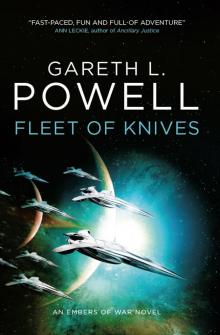 Fleet of Knives
Fleet of Knives Ragged Alice
Ragged Alice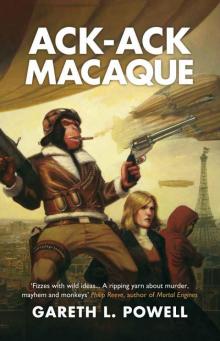 Ack-Ack Macaque
Ack-Ack Macaque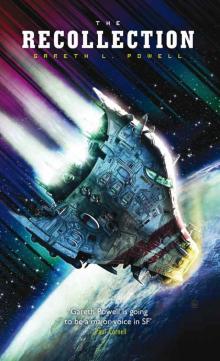 The Recollection
The Recollection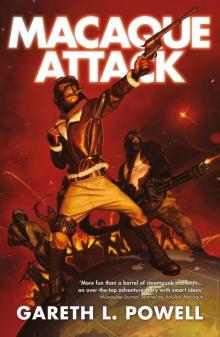 Macaque Attack!
Macaque Attack! Embers of War
Embers of War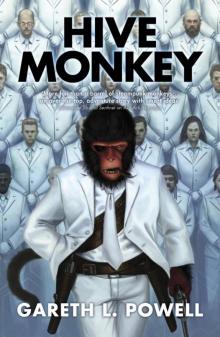 Hive Monkey
Hive Monkey